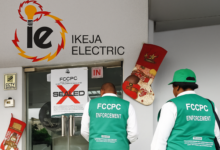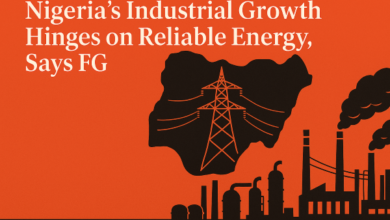Nigeria@62: FG must sustain non-oil campaign, financing to boost manufacturing
 As the Federal Government rolls out the drums to celebrate the country’s 62nd independence anniversary, stakeholders in the manufacturing industry insist targeted campaigns and financing must be sustained to boost non-oil exports in order to achieve economic growth.
As the Federal Government rolls out the drums to celebrate the country’s 62nd independence anniversary, stakeholders in the manufacturing industry insist targeted campaigns and financing must be sustained to boost non-oil exports in order to achieve economic growth.
The call is, indeed, imperative seeing that the country’s economy, 62 years post-independence, is said to be a mixed bag of lows and highs.
At 62, Nigeria remains the biggest economy on the continent with a Gross Domestic Product (GDP) of over 510 billion dollars.
The country is also ranked sixth among the top ten manufacturing destinations on the continent.
Economic indicators reveal that the country’s GDP grew in the second quarter of 2022 by 3.54 per cent year-on-year in real terms, while its oil sector has consistently recorded negative growth for the ninth consecutive quarter, contracting by -11.8 per cent.
Combined, key drivers within the non-oil economy accounted for 78.3 per cent of total GDP in Q2.
Compared to countries like Cameroon, Togo, Madagascar, Somalia, Gabon, Senegal, Mali, and Mauritania, and a host of others, that attained independence in 1960, experts believe that even though Nigeria is not doing badly, there is great room for improvement.
Dr Chinyere Almona, Director-General, Lagos Chamber of Commerce and Industry (LCCI), stated that the country’s economic growth trend, measured by the performance of GDP, had generally been positive over the last two decades.
She, however, noted that the growth of 1.2 per cent recorded for agriculture and the 3 per cent for manufacturing were comparatively low when compared with other sectors that grew at above 5 per cent.
She stated that the quality of the business environment remained a concern to investors, especially in the manufacturing sector.
According to her, weak infrastructure, uncertain policy environment, and institutions have continued to adversely affect the efficiency, productivity, and competitiveness of many enterprises in the economy posing a major risk to job creation and economic inclusion across sectors.
The LCCI DG noted the need to address the weak government revenue base caused by oil theft and pipeline vandalism, rising and unsustainable debt profile, over-dependence on oil revenue, exposure to foreign shocks through inadequate forex supply and double-digit inflation.
In view of this, Almona stated that the Federal Government must sustain its targeted interventions in selected critical sectors like agriculture, manufacturing, export infrastructure and tackling insecurity.
She added that if oil revenue made up more than 80 per cent of government revenue, government was expected to tackle the menace of oil theft and pipeline vandalism with sterner approach.
“It is impossible to have a vibrant manufacturing sector in the face of cheap imports into the country and high production and operating cost in the domestic economy.
“For most manufacturing businesses, it is a nightmare; yet, production is critical to enduring economic and social stability.
“The way forward is to address the fundamental constraints to manufacturing competitiveness in the Nigerian economy.
“Our nation is at a crossroads and in dire need of big decisions to drive the drastic transformation the economy requires to return to economic prosperity,” she said.
Looking back, Mr Segun Ajayi-Kadir, Director-General, Manufacturers Association of Nigeria (MAN), said the discovery of oil ushered in a period of prosperity in the form of huge oil revenue from export of crude oil and more domestic infrastructural development was embarked upon.
The MAN DG stated that the manufacturing sector had been largely unimpressive as the country remained largely import dependent.
He noted that the coronavirus pandemic and the ongoing Russian-Ukraine war had compounded the familiar challenges that had limited the growth and development of the manufacturing sector.
He added that inflation; which had risen to 20 per cent; interest rate at double digits, high rate of foreign exchange and the non prioritisation of allocation to the sector truncated its growth prospects, disrupted its operations and continued to limit the potential of the sector for expansion.
“There is, therefore, the need to address the binding constraints that have continued to militate against the performance of the manufacturing sector and limited its share of contribution to the GDP,” he said.
He recommended that investments in local raw materials through direct incentives must be encouraged and significant proportion of available foreign exchange must be allocated to the productive sector, particularly manufacturing.
Ajayi-Kadir stressed that export support policies, like the Export Expansion Grant (EEG), must operate as planned and other support policies must be allowed to gestate before they are changed.
“The country must improve power supply by removing the impediments to access of the eligible customers scheme by manufacturers.
“We must review the curricular of tertiary institutions to align with industry skill requirements and subject to update based on the direction of global changes.
“Existing major economic road corridors must be rehabilitated and new ones must be constructed for seamless movement of raw materials to factories and finished goods to the markets.
“Also, the capital base of the Bank of Industry (BOI) must be improved to allow for adequate lending to the productive sector by the bank,” he said.
Dr Muda Yusuf, Founder, Centre for the Promotion of Private Enterprises (CPPE), noted that the Information and Communication Technology (ICT) aviation, transportation, education sector, health sector, print and electronic media and many more had been significantly transformed over the past six decades.
Accordingly, Yusuf said the economy had witnessed impactful private sector footprints in many sectors, which had made the Nigerian economy to grow in leaps and bounds over the years.
He, however, stated that the country’s macroeconomic management framework continued to pose serious challenges to investors in the economy as the fragile macroeconomic conditions remained a major cause for concern.
The situation, he posited, had been compounded by the shocks and disruptions inflicted by the Russian invasion of Ukraine and the lingering effects of the coronavirus pandemic.
For the manufacturing sector, Yusuf said high infrastructure deficit, cargo clearing challenges worsening at the ports, weak productivity, regulatory challenges and policy inconsistency, among others, continued to beat down the sector’s potential.
As way forward, he stressed the need for urgent steps to be taken to ensure a better macroeconomic management framework to stabilise the exchange rate, eradicate the challenge of illiquidity in the foreign exchange market and stem the current depreciation of the naira.
“Institutional reforms are necessary to ensure that the regulatory institutions have better disposition to support the growth of investment and focus less on the generation of revenue.
“The international trade process needs to be reformed to prioritise trade facilitation.
“The current obsession for revenue generation is hurting the international trade processes and impacting adversely on domestic and foreign investment.
“Therefore, the orientation of the Nigeria Custom Service, Nigerian Ports Authority, the shipping companies and the terminal operators and the security agencies at the ports need to change in favour of an investment friendly international trade processes,” he said.
The journey thus far for the Nigerian economy, particularly manufacturing, has no doubt, been fraught with daunting challenges. But experts believe that the country has the potential to attain economic growth and development.










